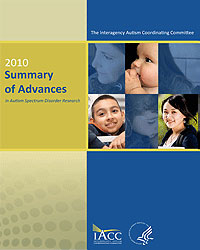Summary of Advances
In Autism Spectrum Disorder Research
2010
Can state early intervention programs meet the increased demand of children suspected of having autism spectrum disorders?
Wise MD, Little AA, Holliman JB, Wise PH, Wang CJ. J Dev Behav Pediatr. 2010 Jul-Aug;31(6):469-76.
Early Intervention programs may be strained by the increase in demand for ASD services and additional resources will likely be necessary, according to reports from state program coordinators. In 2007, the American Academy of Pediatrics recommended that all children be screened for ASD at 18 and 24 months of age. Since that time, most states have seen a greater demand for ASD evaluations and behavioral services. The Early Intervention program provides ASD services for many young children (less than 36 months of age) across the United States, including almost all lower-income children on the spectrum. While the program is funded through the Individuals with Disabilities Education Act (IDEA), each state is expected to coordinate its own program and as a result services vary across states. Widespread staff shortages have made meeting the additional demand for services difficult, with almost half of the Early Intervention coordinators reporting that children in their state or territory receive 5 hours or fewer of weekly services. Only four states reported that most children receive more than 20 hours a week, indicating that the majority of children in Early Intervention programs are not receiving the 25 hours of behavioral intervention recommended by the National Research Council. Reports of personnel shortages were common, with 89 percent of coordinators reporting a need for behavioral therapists, 82 percent reporting a need for speech-language pathologists, and 79 percent for occupational therapists. Staff shortages were more likely to occur in states with a greater percentage of African-American and Latino children. Almost half of states reported that these personnel shortages pose a challenge to creating Individualized Family Services Plans (IFSPs), which guide the early intervention process for children with disabilities and their families, within the required 45-day time limit. Notably, several of the coordinators commented that the intensity of the plans should be scrutinized as well – many programs will only include services in IFSPs that can realistically be provided in the state, rather than the optimal course of treatment (e.g., calling for 5 hours of behavioral therapy when 25 would be ideal). The authors conclude that more resources will be needed to meet the increased demand for services as a result of enhanced early screening. Dedication to strengthening local services will be particularly important during a time when budget pressure could result in deep cuts to available services.




